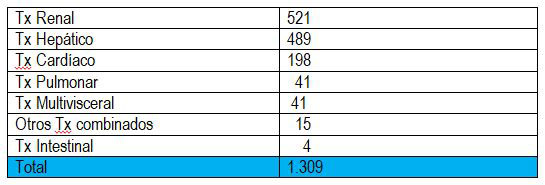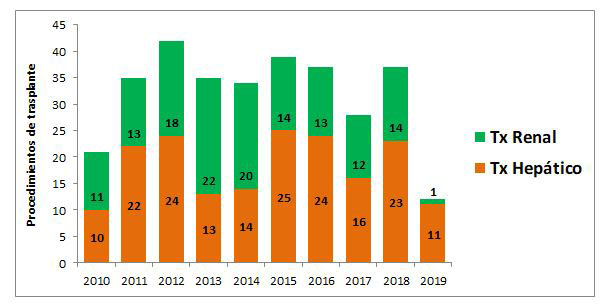Speaking of pediatric donation is talking about a 'generosity with capital letters' that emerges at the most painful moment in the lives of parents after losing a child. But when it occurs, many parents are able to rely on the donation of organs and tissues, giving some sense to this great loss.
In many cases they advance to the transplant coordinators, offering themselves this option. With their gesture, these people want to alleviate the suffering of other parents and other children on the waiting list for transplant.
This was stated by the Acting Minister of Health, Consumption and Social Welfare, María Luisa Carcedo, during the press conference held this morning on the occasion of the National Donor Day of Organs, Tissues and Cells, which is celebrated on June 5, and that this year is dedicated to pediatric donation. Carcedo has been accompanied by the acting General Secretary of Health, Faustino Blanco, the general director of the National Transplant Organization (ONT), Beatriz Domínguez-Gil, the president of the National Federation of Associations of Kidney Patients (ALCER), Daniel Gallego, and the President of the Spanish Federation of Cystic Fibrosis (FQ), Blanca Ruiz, on behalf of all transplant patients.
The National Donor's Day is an initiative of ALCER, which has traditionally been joined by the Ministry of Health, Consumption and Social Welfare. Its objective is to offer a tribute to all donors and their families and remind society that organ donations save thousands of lives every year and contribute to improving the quality of life of countless patients. Along with ALCER and FQ, representatives of the National Federation of Liver Transplants (FNETH), the Spanish National Federation of Heart Transplants (FETCO), the Lymphoma, Myeloma and Leukemia Patients Association and the Sports and Transplant Association of Spain .
The difficulty of pediatric donation
In his speech, Carcedo has highlighted the shortage of organs as the main obstacle to child transplant, to which are added surgical limitations derived from the discordance of size and weight between donors and recipients. "Fortunately, in our country, infant mortality is very low, which implies a shortage of organs suitable for the transplantation of children, which can often be replaced by living donation or deceased adult donor. but it is not always possible, which is why pediatric donation acquires a special meaning, "he assured.
The acting minister also highlighted the emotional impact of pediatric donation for the transplant coordinators and health professionals involved in the donation process. "Many of them are surprised to see how there are parents who, in full mourning, spontaneously offer the donation."
In Spain, pediatric donation data highlight the importance of finding formulas that increase the availability of organs to transplant children. Between 2010 and May 2019, the ONT has registered 314 children's donors (representing 1.8% of the total), 25 children under 1 year old. Nearly 2 out of 3 children's donors (63%) were between 1 and 10 years old.
Very young children on the waiting list for heart transplantation are an example of the difficulty in accessing this type of therapy. Precisely to increase its chances of transplant, the ONT launched the AB0 Incompatible Cardiac Infant Transplant program last year, which has allowed to transplant to date a total of 6 children between 1 and 2 years old (4 in 2018 and 2 as far as 2019). The transplants have been carried out in the Hospital la Paz (4) and in the Gregorio Marañón (2). It is a national program in which the Hospitales Gregorio Marañón and La Paz Infantil de Madrid, Hospital Complex of A Coruña, La Fe de Valencia, Reina Sofía de Córdoba and Vall d'Hebrón de Barcelona take part.
Likewise, the ONT is developing, in collaboration with the Spanish Association of Pediatrics and the Spanish Society of Neonatology, a protocol aimed at promoting pediatric donation, as set out in its Strategic Plan 50 x 22. It is about systematizing the actions before the death of a child in conditions to be a donor, something that happens very infrequently. This is intended to prepare the professionals who are responsible for the care of these children and the transplant coordinators to detect these opportunities for child donation and to approach a family adequately at extremely dramatic moments. The presentation of this protocol is scheduled for the third quarter of the year.
Another route launched by the ONT to increase the availability of pediatric organs is the promotion of international cooperation for the exchange of children's organs with other countries, mainly France, Italy and Portugal.
These measures have begun to bear fruit. In 2018, the children's donation represented 2.0% of the total, with 45 donors. "The data of the ONT indicate that we are managing to reverse the decreasing tendency of the pediatric donation", has added Carcedo.
Pediatric transplants
Between 2010 and May 2019 in our country a total of 1,309 children's transplants have been carried out. Of them, 62 in the first 5 months of 2019.
The breakdown by organs is reflected in the following table:
Pediatric Tx (2010- May 2019) by organs


Of the total transplants, 989 (75%) were performed with organs from deceased donors, both children and adults, and 320 (25%) of living donors.
58% of deceased donor transplants are performed with donor organs of children.
Regarding the type of living donor transplant, 182 were liver and 138 renal (as shown in Table 1)
On the other hand, a total of 74 child transplants (representing 5.7%) have been made with organs from foreign centers. In this case, the majority of donors (89%) are children, 81% are under 11 and 47% less than 3.
Increase the donation
The director of the ONT, Beatriz Dominguez-Gil, has also reported the evolution of donation and transplant activity so far this year. As of May 31, the total number of donors has increased by 7% and the transplants that experienced a greater increase compared to the previous year are lung (+ 5%), liver (+ 3%) and kidney (+2) ,two%).
Representatives of patients
After remembering that this year marks the 40th anniversary of the first National Donor Day in Zaragoza, the president of the National Federation ALCER, Daniel Gallego, highlighted the "enormous solidarity of Spanish society, which allows Spain to lead the number of transplants year after year, even so, we need the donation to continue increasing, because there is still a waiting list to receive an organ. " "Thank you for your generosity to all those who do not hesitate to be donors, you help us so that many of us can make our dreams come true by continuing with our lives, to donate is to love," he added.
For its part, the president of the National Federation of Cystic Fibrosis, Blanca Ruiz, has summarized her own experience with this disease of multi-organ involvement, which may require a transplant of different organs: "I want to thank, on my behalf and in that of all the people who have needed a transplant, to these anonymous heroes who are the donors and their families, they are already a very important part of our life, that one day they gave us without asking for anything in return. : Is there a more generous gesture than giving life? "
Finally, María Luisa Carcedo has shown her gratitude to the whole Spanish society, for her support and contribution to the Spanish transplant system and she has encouraged the citizens to continue donating.
(Table 1) Live donor infant transplants between 2010 and May 2019


